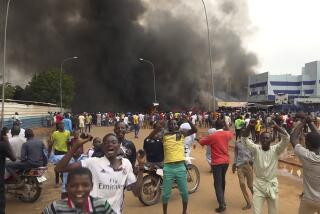U.S. Is Urged Not to Attack Somalia
- Share via
NAIROBI, Kenya — As speculation mounts that Somalia might be the next target in a widening U.S. war on terrorism, United Nations officials here warned Wednesday that any intervention in the war-ravaged country would aggravate the poverty and hunger of hundreds of thousands of Somalis.
“I’m concerned about the impact on a society which had begun to develop a level of security it hadn’t seen for the last six or seven years,” said Randolph Kent, the U.N. humanitarian coordinator for Somalia. “Any disruptive factor--be it from within or, dare I say, from without--can undermine a fragile situation.”
U.S. officials have acknowledged that American forces are patrolling the airspace and seaports around Somalia to prevent Osama bin Laden’s Al Qaeda fighters who might have escaped Afghanistan from relocating there.
The concerns come as several hundred troops from neighboring Ethiopia have crossed into Somalia to train the militias of warlords loyal to Ethiopia, according to Somalia watchers. The Ethiopian-backed warlord armies are believed to be spoiling for a fight with the military of Somalia’s fledgling Transitional National Government in the capital, Mogadishu.
Ethiopia is opposed to the transitional government, which it describes as too Islamist and hostile to Ethiopian interests. Some Somalia experts say Ethiopia, a historical enemy of Somalia, would prefer to have a weak neighbor that poses less of a threat to its security.
Most of the observers willing to discuss the situation in Somalia requested anonymity because of the diplomatic sensitivity of the issues.
Ethiopia has armed and supported rival factions opposed to the transitional government, which was established at a conference in neighboring Djibouti in 2000 and controls only pockets of Somalia.
Some Ethiopian-backed warlords, who control other portions of Somalia, were recently prevented by Ethiopia from attending peace talks with the transitional government here in Nairobi, the Kenyan capital.
Western diplomats in Nairobi say Ethiopia recently expressed a desire to broaden its role in Somalia. During the last few weeks, Ethiopian officials have declared that a Somalian group known as Al-Itihaad al-Islamiya, which has ties to the Al Qaeda terrorism network, is rampant in Somalia and even has representatives in the transitional government. The Bush administration put Al-Itihaad on its terrorist list after the Sept. 11 attacks on the United States.
Western journalists, U.N. officials and Somalia watchers who have traveled to Mogadishu in the last few weeks have not been able to find much evidence that Al-Itihaad is a vibrant group in Somalian society. U.N. officials and others say Al-Itihaad has long disbanded and no longer poses a real threat in the country.
But that does not quell daily reports that the U.S. and its allies are preparing to launch strikes in Somalia, which they fear could be a haven for terrorist groups. Other reports suggest that American forces might use Ethiopia and its surrogate warlord armies as proxies to attack terrorists.
Somalia descended into anarchy after the ouster of dictator Mohamed Siad Barre in 1991 and has been struggling to stabilize.
Kent, the U.N. humanitarian worker, said he did not know what intelligence the U.S. and its allies had gathered on Somalia. He said the United Nations feels that Somalia is safe enough for the operation of medical, social and humanitarian projects to help tens of thousands of sick and hungry people.
“There are U.N. officials crawling all over Somalia trying to provide assistance,” Kent said. “We are working in Somalia because we can work in Somalia. We feel safe, and we are there increasingly.”
Many Somalis, Kent said, are still reeling from President Bush’s decision in November to freeze the assets of Al Barakaat, the country’s largest remittance firm. U.S. authorities say Al Barakaat helped fund Bin Laden’s terrorism network, a charge the company denies. Kent said thousands of Somalis can no longer receive small remittances to survive.
Kent also said hundreds of thousands of people in Somalia’s Gedo region are suffering from hunger after last year’s poor harvest. Any intervention, he said, could result in more tragedy.
“Any factor that destabilizes a fragile situation is always a danger,” he said.
More to Read
Sign up for Essential California
The most important California stories and recommendations in your inbox every morning.
You may occasionally receive promotional content from the Los Angeles Times.













